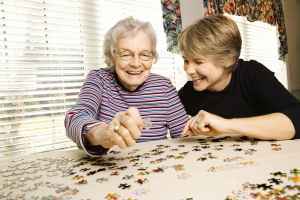Assisted Living in Washington
Also known as the Evergreen State, Washington is America's 13th-largest state and one of the most economically and culturally vibrant destinations in North America. Its population has grown over 13% since 2010, and the over-65 population is the second-fastest-growing demographic represented in that growth at over a 15% increase over the same time period according to data from the US Census Bureau.
With its temperate climate, abundance of outdoor recreational opportunities and a favorable taxation structure for retirees, it's not surprising that Washington is a popular destination for seniors. This is so despite the fact that assisted living costs here are on the high side at a $5,500 monthly average across the state, considerably above the national average of $4,051.
This guide provides specific cost data with comparisons of different care services within the state and of the expenses of assisted living in major Washington cities and nearby states. It also covers quality of life for seniors, financial assistance programs, the state rules and regulations governing assisted living, and further services and supports.
SeniorAdvice's Guide to Assisted Living in Washington
Washington currently has a good SeniorScore of 70%, just under the national average of 72%. The SeniorScore is the outcome of analyzing over 100 data points in the private and public spheres, carried out to highlight the pros and cons of life in various regions of the country for seniors.
SeniorScore™ for Washington
 The SeniorScore™ is calculated based on over 100 variables, some of which are shown below. The final score is curved based on a linear curving method. For More info visit senioradvice.com/seniorscore.
The SeniorScore™ is calculated based on over 100 variables, some of which are shown below. The final score is curved based on a linear curving method. For More info visit senioradvice.com/seniorscore.
- Washington's SeniorScore™ of 70 is lower than the national average of 72.
- Washington has high access to Medicare registered healthcare providers.
- Washington has an average number of hospitals within the state.
- Washington has a very high number of senior living facilities within the state.
- Washington has an average number of home healthcare providers operating in the state.
- The average life expectancy in Washington is 79.9, compared to the national average of 78.6.
- Washington has a high overall property crime rate compared to national averages.
- Washington has an average overall violent crime rate compared to national averages.
- 30% of the population in Washington are seniors, compared to 29% nationally.
- Washington has 281 golf courses in the state.
- Washington has a high number of municipal parks throughout the state.
- Washington has 1,969 churches in the state.
- The property taxes average 3.48% of total income in Washington, which is significantly higher than the national average of 2.79%.
- The property taxes average 0.92% of property value in Washington, which is significantly lower than the national average of 1.09%.
- The average sales tax in Washington is 8.30%, which is significantly higher than the national average of 6.97%.
- The average state income tax in Washington is 0.00%, which is significantly lower than the national average of 3.38%.
- The mean household income in Washington is $76,158, which is significantly higher than the national average of $64,580.
- Washington's median household income is $61,495, which is significantly higher than the national average of $51,560.
- The average per capita income in Washington is $30,466, which is significantly higher than the national average of $25,611.
- Assisted living costs in Washington average $51,908 per year, which are significantly higher than the national average of $42,700.
- Nursing home costs in Washington average $115,525 per year, which are significantly higher than the national average of $92,481.
- Costs for adult daycare in Washington average $17,588 per year, which are lower than the national average of $17,931.
- Costs for home healthcare in Washington average $55,485 per year, which are significantly higher than the national average of $46,197.
- The unemployment rate is about 8.36% in Washington, which is higher than then national rate of 8.26%.
- The overall cost of living in Washington is high compared to national averages.
- 0.63% of the senior population in Washington are financially responsible for at least one grandchild.
- Washington receives an average of 35.8 inches of rain per year.
- Washington has an average annual temperature of 50.9 degrees fahrenheit.
- Washington has an average low temperature of 41.0 degrees fahrenheit.
- Washington has an average high temperature of 59.8 degrees fahrenheit.
- Washington has an average population density of 1,062 people per square mile.
- Washington has a low public school quality ranking.
- Washington has a very high public school safety ranking.
- Washington has a high graduation rate of 89.42%.
General quality of life in Washington rates highly due to its temperate climate, the diverse recreational and lifestyle options and the wide array of outdoor recreational activities on offer and easy to access even from the heart of the Seattle-Tacoma-Bellevue metropolitan area. Fresh food at farmer's markets, lower crime rates than the national average and the close proximity of world-class health care facilities also contribute to the overall positive picture.
Though the cost of living tends to be high, Washington is tax-friendly for retirees, making it a financially attractive option for assisted living. The state doesn't tax social security benefits, retirement accounts or pensions.
Top Assisted Living Facilities in Washington
Kindred Hospital Seattle - First Hill is a 23 bed nursing care facility. It is situated in the First Hill neighborhood of Seattle, Washington. With an average per-household income of $37,606, the facility is in a primarily middle ...
Avamere Olympic Rehabilitation of Sequim is a 125 room nursing home facility situated in Sequim, Washington. The surrounding area has a dense population, with roughly 28,000 poeple living in the 98382 zip code. It is a primarily middle ...
Judson Park is located at 23620 Marine View Drive South in Des Moines, Washington. It is a 96 bed senior housing community. With a median family income of $59,070, the community is in a primarily middle class ...
Issaquah Nursing and Rehabilitation Center is a 140 bed nursing care facility located in Issaquah, Washington. With a median per-household income of $94,297, the community is in a largely well-to-do area. It is densely populated, with around 27,000 ...
Situated within the Bitter Lake neighborhood of Seattle, Washington, Ida Culver House Broadview Ncc is a 74 bed senior housing community. The facility is in a predominantly middle income area, with an average per-family income of $57,182. It ...
Redmond Care and Rehabilitation Center is located within the Grass Lawn neighborhood of Redmond, Washington. It is a 139 unit nursing facility. The facility is in a mostly upper class area, with an average per-family income of $93,173. ...
Manorcare Health Services - Salmon Creek is a 120 room nursing home facility situated in Vancouver, Washington. The facility is in a generally middle income area, with an average family income of $70,201. With roughly 18,000 people residing ...
Located in the Interlake neighborhood, Overlake Terrace is a senior housing community serving Redmond, Washington. The community is in a mostly affluent area, with a median per-household income of $93,173. It is densely populated, with approximately 59,000 residents ...
Located within the Brighton neighborhood of Seattle, Washington, Kline Galland Home is a 205 unit senior housing facility. With a median family income of $51,093, the community is in a mostly middle income area. It is heavily populated, ...
Located within the Springfield neighborhood of Olympia, Washington, Providence Mother Joseph Care Center is a 152 bed senior care community. With an average household income of $58,257, the facility is in a predominantly middle income area. It has ...
Situated within the Northgate area of Seattle, Washington, Kindred Hospital Seattle - Northgate is a 30 room skilled nursing facility. The community is in a generally middle class area, with an average per-family income of $47,910. It has ...
Overlake Senior Care is a senior housing facility located within the WoodRidge neighborhood of Bellevue, Washington. With a median per-household income of $72,812, the community is in a largely middle income area. It has a medium-density population, with ...
Located within the Cascade neighborhood of Seattle, Washington, Mirabella Seattle is a 42 room senior care community. With roughly 22,000 poeple living in the zip code of 98109, the neighboring area has a dense population. It is a ...
Foss Home and Village is a 211 room senior housing facility. It is located within the Bitter Lake neighborhood of Seattle, Washington. The community is in a generally middle income area, with a median per-household income of $57,182. ...
Situated near by the Alderwood Manor neighborhood of Lynnwood, Washington, ManorCare Health Services-Lynnwood is a 113 unit nursing care facility. With approximately 28,000 individuals living in the zip code of 98037, the surrounding area is heavily populated. It ...
Regency Auburn Rehabilitation Center is located at 414 17th SE in Auburn, Washington. It is a 96 bed nursing facility. With an average per-family income of $40,586, the facility is in a mostly middle income area. ...
Life Care Center of Puyallup is a 202 room senior housing facility. It is located at 511 10th Avenue SE in Puyallup, Washington. The encompassing area has a dense population, with about 23,000 poeple living in the 98372 ...
Manorcare Health Services - Lacey is a 120 room nursing care facility situated close to the The Birches neighborhood of Lacey, Washington. The community is in a generally middle income area, with an average household income of $58,777. ...
Olympia Manor Rehabilitation Center is situated within the Indian Creek neighborhood of Olympia, Washington. It is a 28 room nursing home facility. With about 39,000 poeple living in the 98501 zip code, the surrounding area is heavily populated. ...
Situated in the Mountain View neighborhood of Vancouver, Washington, Avamere Rehabilitation of Cascade Park is an 88 bed nursing home facility. With roughly 32,000 individuals living in the 98683 zip code, the neighboring area has a dense population. ...
The Cost of Assisted Living in Washington
The monthly cost of assisted living in Washington State averages $5,500, which is considerably more expensive than the national average of $4,051. The cost gap is even wider with the neighboring state of Idaho (which averages $3,728 per month), and nearby Montana ($3,820 monthly) and Nevada ($3,400 monthly). Southern neighbor Oregon is closer in cost at $4,400 per month, but there remains no doubt that assisted living costs in Washington clearly outstrip the expenses in all nearby states.
- Washington State: $5,500
- United States: $4,051
- Idaho: $3,728
- Montana: $3,820
- Nevada: $3,400
- Oregon: $4,400
The Cost of Assisted Living in Washington’s Top Cities
Though the monthly state average cost for assisted living is high, the price is even higher in Washington's largest city of Seattle, where the median average is $6,500. Other nearby cities are considerably less costly, with Spokane costing $4,000 per month, Tacoma coming in at $4,723 monthly, Vancouver's monthly expense at $4,998 and Yakima costing $5,000 monthly. Overall, the pattern is that assisted living grows more expensive the closer one is in the state to the major urban center at Seattle, but even the lower threshold of costs is only just below the national average.
- Seattle: $6,500
- Spokane: $4,000
- Tacoma: $4,723
- Vancouver: $4,998
- Yakima: $5,000
Senior Cost Care Comparisons in Washington
Of the five main categories of senior care, assisted living is actually the second-least-expensive option in Washington state. The least expensive by a considerable margin is Adult Day Care, which costs an average of $1,441 per month. In-home care is close in overall expense to assisted living, running to $5,720 per month, and home health care services just slightly higher at $5,815. By far the most expensive option is nursing home care, which costs an average of $9,112 monthly.
- Assisted Living: $5,500
- In-Home Care: $5,720
- Home Health Care: $5,815
- Adult Day Care: $1,441
- Nursing Home Care: $9,112
Financial Assistance for Assisted Living in Washington
Medicaid Personal Care (MPC)
Address: Cherry Street Plaza, 626 8th Avenue SE, Olympia, WA 98501
Phone Number: (800) 562-3022
Website: https://www.hca.wa.gov/health-care-services-supports/program-administration/medicaid-personal-care
Part of the Washington State Medicaid plan, Medicaid Personal Care provides personal care for eligible individuals that includes support for activities of daily living. It also provides for nursing services, and because it counts as an entitlement program, qualified applicants are guaranteed access to services without worry about waiting lists.
Functionally eligible applicants must need assistance to perform at least three basic activities of daily living. Applicants will also qualify financially if they're already eligible for Non-institutional, Categorically Needy Medicaid, a stricter set of criteria than regular Medicaid. Applicants must be enrolled in Medicaid and can submit an application online.
Community First Choice Option (CFCO)
Phone Number: (360) 725-2393
Website: https://www.dshs.wa.gov/altsa/stakeholders/community-first-choice-cfc-option
Designed for people who need institutional levels of care and are already eligible for specific waiver, SSI-related and Medicaid programs, this program is designed to support personal care for a variety of different care scenarios, including assisted living facilities. Eligible applicants have to demonstrate a need for intermediate or higher levels of facility care, as well as meeting specific income limits and without being enrolled in redundant programs. Qualified applicants receive access to care support immediately.
CFCO directly supports medication assistance and other nursing tasks, housework, transportation assistance, assistive technology and skill acquisitions training, community transition services and more. More detail about eligibility requirements can be found at the program's website.
Nurse Delegation Program
E-mail: [email protected]
Website: https://www.dshs.wa.gov/altsa/residential-care-services/nurse-delegation-program
The Nurse Delegation Program was created for registered nurses who wish to help train nursing students and caregivers in the necessary skills to provide in-home or assisted living care. These designated RNs are called Registered Nurse Delegators, and their training support can help bring down the cost of assisted living and other forms of care. Eligible applicants must qualify as Categorically Needy under Medicaid and have no more than $2,000 in countable assets.
Washington State Assisted Living Rules and Regulations
Assisted Living facilities (ALFs) in Washington State are regulated by the Aging and Long-Term Support Administration, a part of the Washington State Department of Social and Health Services. These facilities are defined in state legislation as housing and providing services including domiciliary care for seven or more residents; ALTSA provides an overview of the rules and regulations on its website, as well as a more detailed breakdown in PDF form.
Scope of Care | Assisted living facility staff provide room and board and assistance with activities of daily living (ADL). Some may also provide limited nursing care, memory care, and mental and behavioral health supports. |
Care Plan Requirements | The facility must provide a negotiated resident service plan based on pre-admission assessment conducted by a licensed medical practitioner, and including medical history and identification of the resident's level of personal care needs. The service plan must be revised and updated after regular annual reviews or any major health event. |
Medication Management Requirements | The facility must provide medication assistance as stipulated in the resident's negotiated plan of service. If the resident refuses medication for any reason, the facility is required to abide by that decision, document the time and date of that refusal and notify their primary care practitioner or health care provider. |
Staff Requirements | An ALF is required to provide sufficient staff to fulfil the negotiated service agreement of every resident, keep the facility properly-maintained and respond to fires and other emergencies. Weekly staffing schedules have to be documented and retained for 12 weeks after working. |
Staff Training Requirements | Staff and volunteers are required to undergo detailed background checks and undergo training and orientation that ensures they'll be able to carry out the tasks asked of them effectively. Staff cannot be directly employed by a resident or their family while working for the facility. |
Medicaid Coverage | The ALF must clearly state its policy on accepting payment through Medicaid, and must clearly state the circumstances in which Medicaid-eligible residents are covered whether their Medicaid starts before or after admission. |
Reporting Abuse | Wherever a staff person has reason to suspect a resident is the victim of financial exploitation, abuse or neglect, they're required to make an immediate report to law enforcement, to the appropriate department and to the Aging and Disability Services Administration Complaint Resolution Unit hotline. The department's toll-free number for reporting abuse and neglect must be prominently displayed in all facilities. |
Free Assisted Living Resources in Washington State
Aging and Disability Resource Center (ADRC)
The National Aging and Disability Resource Center program, or ADRC, is designed to streamline access for older adults and the disabled of all ages to long-term care and housing. ADRCs serve as an integrated point of entry for families seeking information and access to all the various services, benefits and supports relevant to their long-term care needs or the needs of loved ones. Its mandate is to build strong partnerships with local community organizations, aging and disability advocates, and healthcare providers, and to provide personalized counseling and support to members of the public.
Contact: For further information about the state's ADRC program, call (360) 725-3548 or e-mail [email protected]
Long-Term Care Ombudsman Program (LTCOP)
The Washington State Long-Term Care Ombudsman Program (LTCOP) advocates for the residents of long-term care facilities, including assisted living facilities, to ensure that they enjoy high-standard and quality care and are not subjected to abuse, neglect or exploitation. The program receives and resolves complaints about quality-of-care and works to educate families, residents, caregivers, facility staff and the public at large about residents' rights.
Contact: The program can be reached by email at[email protected] and by phone at (800) 562-6028.
Washington Health Care Association (WHCA)
Although it's primarily focused on providing services and supports for the managers and caregivers running assisted living facilities in Washington state, the WHCA also provides information resources for potential residents. These include guidelines for how to participate in care conferences, the practicalities of moving into assisted living and education for family members on how to get the most out of visits to their loved ones.
Contact: Call (360) 352-3304 or the toll-free line at (800) 562-6170.
Washington State Agencies
Aging and Long-Term Support Administration (ALTSA)
Address: DSHS CSD - Customer Service Center, PO BOX 11699, Tacoma, WA 98411-6699
Phone Number: (800) 865-7801
Website: https://www.dshs.wa.gov/altsa
The ALTSA provides information resources designed to help seniors navigate the complexity of finding and financing assisted living and other kinds of long-term care. This includes guidance for accessing social security, Medicaid benefits and residential support waivers and assistance in finding the right facility.
Washington's Community Living Connections Network (CLC)
Phone Number: (855) 567-0252
Website: https://www.waclc.org/consite/
The CLC is a joint initiative of the Center for Medicare and Medicaid Services, the Veterans Administration and of the federal Department of Health and Human Services. It's designed to help caregivers, families, older adults and their legal representatives and people with disabilities to locate and access needed care. This includes information resources and supports for facility-based care that includes assisted living facilities.
Area Agencies on Aging in Washington State
Area Agencies on Aging across the state provide unbiased advice on aging-related issues, along with referrals to further services, for seniors, families and caregivers. Staff can provide guidance in coordinating care and submitting applications for services and supports.
Specific agencies can be located through the Washington Association of Area Agencies on Aging (W4A), who can be reached by phone at (360) 485-9761 or e-mail at [email protected].
Veterans Affairs Offices in Washington State
The Washington State Department of Veterans Affairs provides integrated access for a range of veterans' services and programs in the state. This includes guidance from Service Officers for applying to benefits programs like the Aid and Attendance pension, which supports senior veterans with demonstrated medical need for assisted living solutions.
The WDVA can be reached by phone at (800) 562-2308 or by e-mail for benefits inquiries at [email protected].
Social Security Offices in Washington State
There are multiple offices throughout the State of Washington that can provide assistance with accessing social security income (SSI) benefits. Washington residents aged 65 or over, if they meet certain income and resource requirements, may be eligible for such benefits, which can also have a bearing on eligibility for other kinds of financial support and can be relevant to cutting down the costs of assisted living. A directory of social security offices in the state can be found online.
Other Cities in Washington


 The SeniorScore™ is calculated based on over 100 variables, some of which are shown below. The final score is curved based on a linear curving method. For More info visit
The SeniorScore™ is calculated based on over 100 variables, some of which are shown below. The final score is curved based on a linear curving method. For More info visit 


















 Your Information is Processing
Your Information is Processing